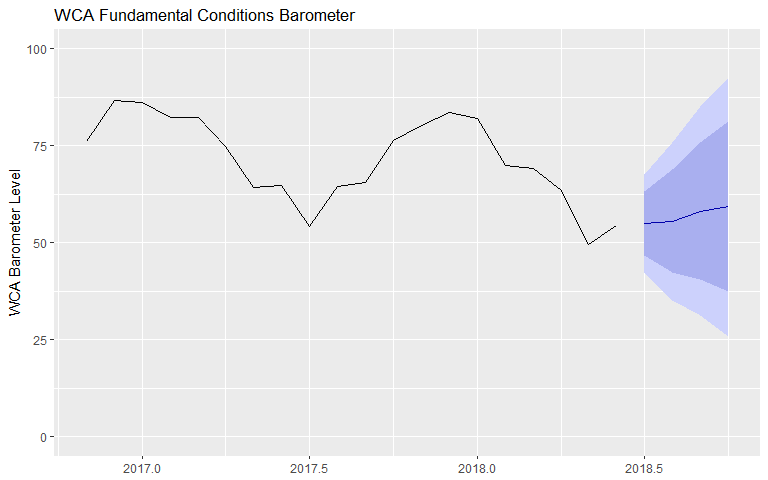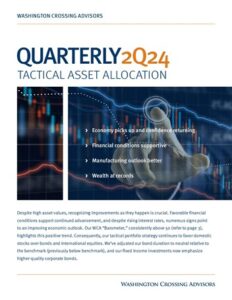Monday Morning Minute 072318
THE WEEK AHEAD
A move in the right direction?
WCA PORTFOLIO INSIGHT
After five months of slippage, the WCA Fundamental Conditions Barometer (chart, below) increased last month. The barometer takes into account market measures of risk appetite, indicators of U.S. economic health, and several inputs on conditions overseas. Trends in risk appetite are generally positive, but less robust than a six or nine months ago. By and large, most trends concerning the domestic economy, such as capital goods orders, employment, and earnings trends, are also quite good. We can’t call one month’s improvement a trend, but the interruption of the downtrend in our barometer is at least a step in the right direction.
Source: WCA
Mixed Bag
To put this all in context, the improvement in global growth, risk appetite, and wealth, which began in early 2016 remains broadly intact. We expect to see strong numbers for second quarter U.S. growth, the stock market sits near records, and U.S. household net worth now exceeds $100 trillion, according to Federal Reserve estimates. Importantly, investment in capital goods (which we see as a proxy for investment) remain solidly in an uptrend. Core capital goods orders for the March-May period averaged $67.5 billion a month, a 6% improvement from a year ago. Seen through this lens, confidence appears strong and is providing an impetus for near-term growth. Importantly, we have yet to see any significant damage to the economy as the result of escalating trade issues.
It appears to us, that some doubt has crept back into the “synchronized global growth” story, however. China’s stock market has fallen into bear market territory. Industrial metals prices have fallen sharply. Surveys of business confidence across Europe have tailed off. The dollar has gained strength this year versus most currencies, and the Chinese yuan has fallen sharply (by around 7%) since trade tensions really began to heat up last spring. Prospects for higher interest rates here in the United States, meanwhile, have flattened the yield curve and corporate spreads have widened.
Against a generally positive backdrop for U.S. growth, there are a few areas of weakness in the bull case for global growth that were not present six months or a year ago.
For now, we will follow the data where it leads. Our initial read on June was it was a modest positive step. This leads us to modestly increased risk exposure based on our short-term tactical view.
Tactical Satellite (Based on 3-6 Month Outlook)
- Overweight Stocks vs. Bonds
Kevin Caron, CFA, Senior Portfolio Manager
Chad Morganlander, Senior Portfolio Manager
Matthew Battipaglia, Portfolio Manager
Suzanne Ashley, Analyst
(973) 549-4168
www.washingtoncrossingadvisors.com
______________________________________________________________________________________________________________________________
Disclosures
WCA Fundamental Conditions Barometer Description: We regularly assess changes in fundamental conditions to help guide near-term asset allocation decisions. The analysis incorporates approximately 30 forward-looking indicators in categories ranging from Credit and Capital Markets to U.S. Economic Conditions and Foreign Conditions. From each category of data, we create three diffusion-style sub-indices that measure the trends in the underlying data. Sustained improvement that is spread across a wide variety of observations will produce index readings above 50 (potentially favoring stocks), while readings below 50 would indicate potential deterioration (potentially favoring bonds). The WCA Fundamental Conditions Index combines the three underlying categories into a single summary measure. This measure can be thought of as a “barometer” for changes in fundamental conditions.
The information contained herein has been prepared from sources believed to be reliable but is not guaranteed by us and is not a complete summary or statement of all available data, nor is it considered an offer to buy or sell any securities referred to herein. Opinions expressed are subject to change without notice and do not take into account the particular investment objectives, financial situation, or needs of individual investors. There is no guarantee that the figures or opinions forecasted in this report will be realized or achieved. Employees of Stifel, Nicolaus & Company, Incorporated or its affiliates may, at times, release written or oral commentary, technical analysis, or trading strategies that differ from the opinions expressed within. Past performance is no guarantee of future results. Indices are unmanaged, and you cannot invest directly in an index.
Asset allocation and diversification do not ensure a profit and may not protect against loss. There are special considerations associated with international investing, including the risk of currency fluctuations and political and economic events. Investing in emerging markets may involve greater risk and volatility than investing in more developed countries. Due to their narrow focus, sector-based investments typically exhibit greater volatility. Small company stocks are typically more volatile and carry additional risks, since smaller companies generally are not as well established as larger companies. Property values can fall due to environmental, economic, or other reasons, and changes in interest rates can negatively impact the performance of real estate companies. When investing in bonds, it is important to note that as interest rates rise, bond prices will fall. High-yield bonds have greater credit risk than higher-quality bonds. The risk of loss in trading commodities and futures can be substantial. You should therefore carefully consider whether such trading is suitable for you in light of your financial condition. The high degree of leverage that is often obtainable in commodity trading can work against you as well as for you. The use of leverage can lead to large losses as well as gains.
All investments involve risk, including loss of principal, and there is no guarantee that investment objectives will be met. It is important to review your investment objectives, risk tolerance and liquidity needs before choosing an investment style or manager. Equity investments are subject generally to market, market sector, market liquidity, issuer, and investment style risks, among other factors to varying degrees. Fixed Income investments are subject to market, market liquidity, issuer, investment style, interest rate, credit quality, and call risks, among other factors to varying degrees.
This commentary often expresses opinions about the direction of market, investment sector and other trends. The opinions should not be considered predictions of future results. The information contained in this report is based on sources believed to be reliable, but is not guaranteed and not necessarily complete.
The securities discussed in this material were selected due to recent changes in the strategies. This selection criteria is not based on any measurement of performance of the underlying security.
Washington Crossing Advisors LLC is a wholly owned subsidiary and affiliated SEC Registered Investment Adviser of Stifel Financial Corp (NYSE: SF).




